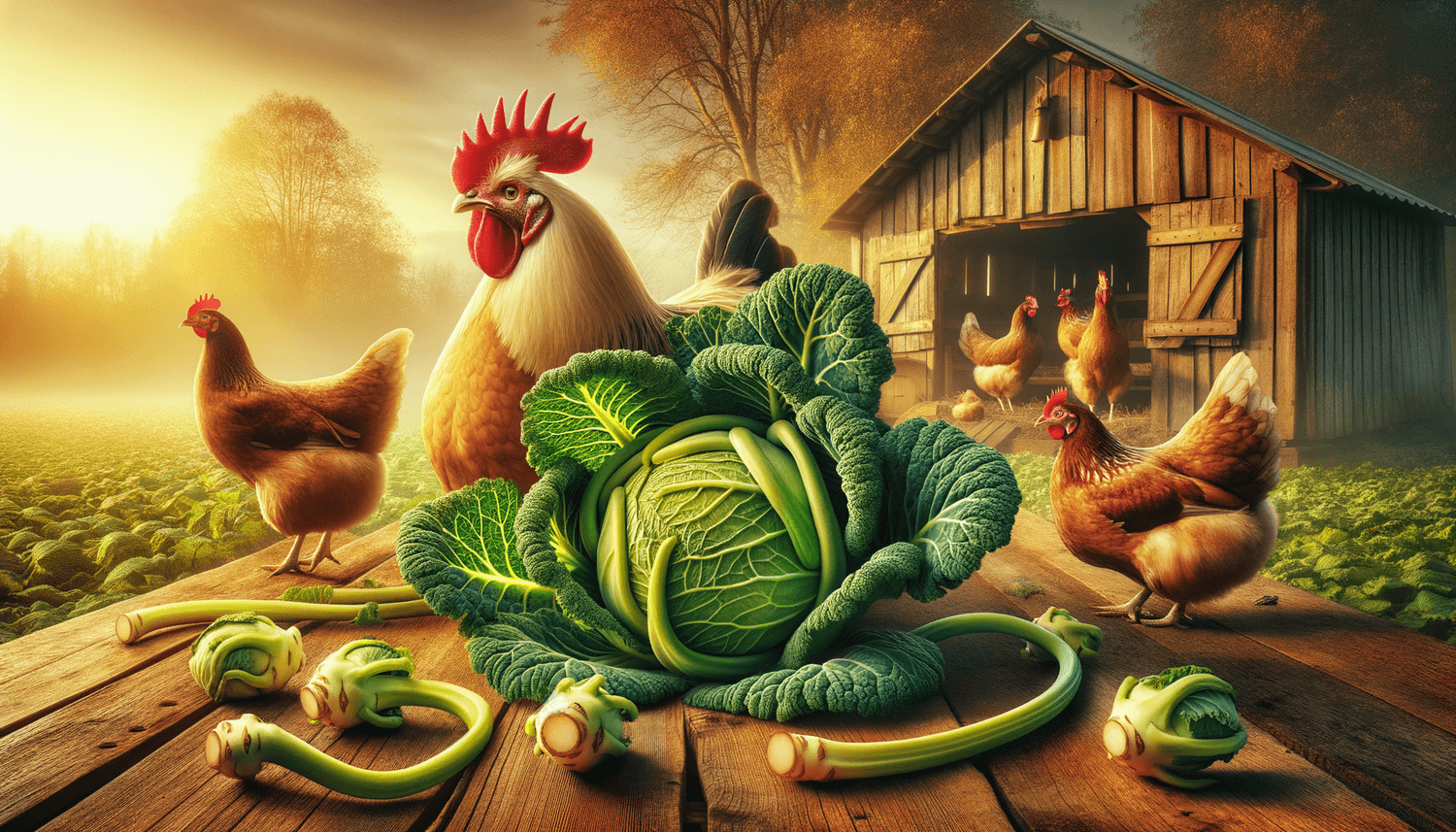Welcome fellow chicken enthusiasts to another cluck-tastic blog post! Today we’re going to explore the world of kohlrabi – that funky, bulbous, alien-like vegetable that you may have seen in your local farmer’s market or grocery store. But, hold your feathers! Can our feathered friends indulge in this cruciferous delight? Well, you’re in luck because we’re going to peck into whether chickens can eat kohlrabi or not, the importance of a balanced diet, the benefits and potential risks, the nutritional value, and even how to prepare this unassuming veggie for your backyard flock’s enjoyment. Get ready to scratch up some fun facts, fellow chicken lovers!
Can chickens eat kohlrabi?
Yes, chickens can safely eat kohlrabi! This vegetable is not only safe, but it’s also a healthy and nutritious treat for your backyard flock. Kohlrabis are packed with vitamins and minerals that benefit the overall health and well-being of your chickens, making them an excellent choice for a nutritious snack.
A balanced diet for happy, healthy chickens
Just like us humans, chickens need a balanced diet to thrive and stay healthy. Providing your feathered friends with the right nutrients is essential for their growth, egg production, and overall well-being. A chicken’s diet should primarily consist of a high-quality chicken feed, which should make up around 80-90% of their diet. This chicken feed is specially formulated to contain the correct balance of protein, vitamins, and minerals that chickens require.
The remaining 10-20% of a chicken’s diet can consist of treats like fruits and vegetables, which not only add variety to their diet but also provide extra vitamins and minerals. However, it’s important to remember that these treats should be offered in moderation, as an excessive amount of treats can lead to nutritional imbalances and health problems. So, while kohlrabi and other treats are safe and beneficial for your chickens, always make sure to prioritize their chicken feed and keep the diet well-rounded.
Nutritional value of kohlrabi for chickens.
Feeding kohlrabi to chickens offers several nutritional benefits, as it is a nutrient-rich vegetable. Kohlrabi is an excellent source of vitamin C, which plays a vital role in promoting a strong immune system and helping chickens ward off illnesses. Additionally, this cruciferous vegetable contains essential minerals such as potassium and magnesium, which are necessary for maintaining healthy bodily functions and optimal growth in your flock.
Kohlrabi is also a good source of dietary fiber, which is beneficial for a chicken’s digestive health. Although chickens don’t need as much fiber as humans do, providing them with a moderate amount of fibrous treats like kohlrabi can help ensure their digestive systems function smoothly. Furthermore, kohlrabi has a high water content, which can aid in keeping your chickens hydrated, especially during hot summer days when water intake is essential.
Overall, there’s no denying that kohlrabi packs a nutritional punch for chickens. Including this vegetable, in moderation, as part of their treat allowance can offer a welcome boost to their overall health, ensuring you have a flock of happy and thriving chickens.
Nutrition table of kohlrabi for chickens.
| Information | Description |
|---|---|
| Nutritional Value | Rich in vitamin C, potassium, and magnesium; good source of dietary fiber |
| Suggested Serving Size | Small portions, making up 10-20% of the chicken’s diet alongside other treats |
| Safe Feeding Practices | Feed in moderation, ensuring it does not replace high-quality chicken feed |
| Preparation | Wash and chop into small pieces or shreds for easy consumption |
| Potential Risks | Excessive consumption may lead to nutritional imbalances and health issues |
| Hydration | High water content can help keep chickens hydrated, especially in hot weather |
| Digestion | Fiber content aids in maintaining a healthy digestive system |
| Seasonal Availability | Typically available in spring and fall, varies by region |
| Other Benefits | Boosts immune system health and promotes overall well-being |
Preparing kohlrabi for your chickens
Now that you know about the benefits of kohlrabi for your chickens, let’s discuss how to prepare this nutritious treat for your feathered friends. First, make sure to thoroughly wash the kohlrabi to remove any dirt, pesticides, or chemicals. Next, remove the tough outer skin using a vegetable peeler or sharp knife. You can either chop the kohlrabi into small bite-sized pieces or shred it, depending on your preference and your flock’s taste.
Remember, chickens don’t have teeth, so it’s important to ensure the pieces are small enough for them to swallow easily. You can also share the leaves of the kohlrabi plant with your chickens since they are also safe and nutritious for them to consume.
How often to feed kohlrabi to your flock
As a treat, kohlrabi should be fed to your chickens in moderation. While it’s essential to offer a variety of treats for the overall health and happiness of your flock, remember that the bulk of their diet should still come from high-quality chicken feed. You can offer kohlrabi to your chickens once or twice a week, ensuring that you rotate it with other nutritious fruits and vegetables like leafy greens and berries to provide a well-rounded and balanced diet.
In conclusion
Kohlrabi is a safe, nutritious, and delicious treat that your chickens will love. Its nutritional value, hydration benefits, and fiber content contribute positively to the overall health of your flock, making it a wonderful addition to their treat allowance. By following safe feeding practices and offering a balanced diet, you can ensure that your backyard chickens thrive and produce high-quality, delicious eggs. So, why not give kohlrabi a try and watch your feathered friends cluck with joy!

















